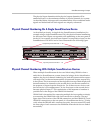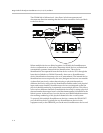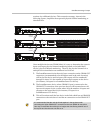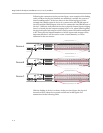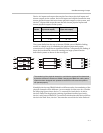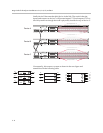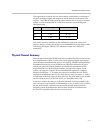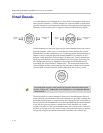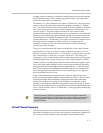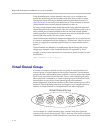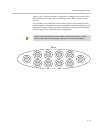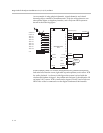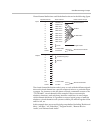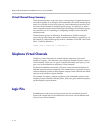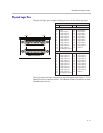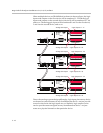
SoundStructure Design Concepts
3 - 11
example, mutes or changes volume) the SoundStructure devices through the
virtual channel names, not the underlying physical input and output that a
particular audio signal is connected to.
For instance, if a virtual channel were named “Podium mic” then the control
system code would control this channel by sending commands to “Podium
mic”. It would not matter to the control system if on one installation “Podium
mic” were wired to input 1 and on another installation “Podium mic” was
wired to input 17. The same control system code can be used on both
installations because the SoundStructure devices translate the virtual channel
reference to the underlying physical channel(s) that were specified when the
virtual channel was defined. By using the same API commands on different
systems that refers to “Podium mic”, the control system code is insulated from
the actual physical connections which are likely to change from one
installation to the next. The virtual channel definition makes the design
portable and easily reusable.
The use of virtual channels also improves the quality of the control system
code because it is easier to write the correct code the first time as it is more
difficult to confuse “Podium mic” vs. “VCR audio” in the code than it would
be to confuse input 7 on device 2 vs. input 9 on device 1. The clarity and
transparency of the virtual channel names reduces the amount of debugging
and subsequently the amount of time to provide a fully functional solution.
Another benefit of working with virtual channels is that stereo signals can be
more easily used and configured in the system without having to manually
configure both the left and right channels independently. As will be shown
later in this manual, the SoundStructure Studio software will automatically
create the appropriate monaural mixes when interfacing a stereo signal to
mono destination and vice versa.
Using virtual channels that represent stereo physical signals reduces the
chance of improper signal routings and processing selections. The net result
is that both designs and installations can happen faster and with higher
quality.The motivation for using virtual channels is to make the system
reusable across different installations regardless of how the system is wired
because the SoundStructure device knows how to translate commands that are
sent to virtual channels, such as “Podium mic”, to the appropriate underlying
physical channel.
Virtual Channel Summary
Virtual channels are a new concept introduced for SoundStructure products
that makes it possible to refer to one or more physical channels at a higher level
by creating a virtual channel and a memorable virtual channel name.
popo
Virtual channels are a high-level representation that encompasses information
about the physical channel. Virtual channels are used to configure and control the
underlying physical channel(s) without having to know the underlying physical
channel numbers.



